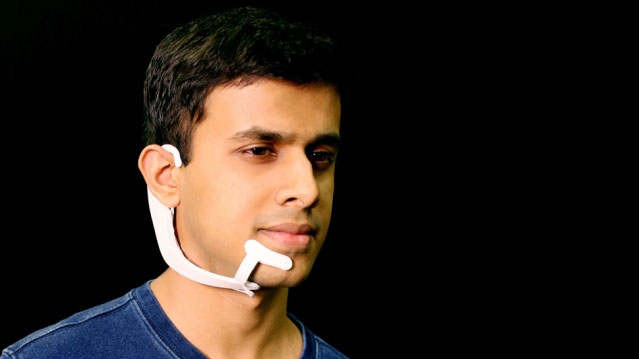MIT’s ‘mind-reading’ device brings us closer to sending texts with our brains
This headset measures subvocalization signals

Sign up for breaking news, reviews, opinion, top tech deals, and more.
You are now subscribed
Your newsletter sign-up was successful
Using your hands to press buttons on a screen is so 20th century. Thankfully, we’re edging closer to a totally hands-free device with each month that passes.
While most of the brain-computer interface devices that we’ve seen up until this point use EEG to detect brain activity, a device just revealed by a team of researchers at MIT works by measuring subvocalization signals.
Those are the small signals that get sent from your brain to your mouth when you think about speaking but don’t actually speak.
Mind over matter
You’ll be familiar with subvocalization if you’re the sort of person who likes to ‘read’ things in your head or have ‘vocal’ conversations silently in your brain.
What’s interesting is that even when subvocalizing, your brain is still sending signals to your mouth, just not enough that you’ll actually, you know, speak.
The MIT headset, called AlterEgo, detects these signals, processes them through a neural network that can translate the signals into words, then feed the words back to you via bone-conduction audio.
In the tests so far, the team has used the headset to navigate a Roku box, report the time, and cheat at chess, but the implications are far-reaching and very exciting. Check out the video of AlterEgo in action below:
Sign up for breaking news, reviews, opinion, top tech deals, and more.
The digital interface that we currently have with our devices is very unnatural, and while a vocal interaction is better, not everyone is going to feel happy speaking out loud to their phone while out and about.
Current EEG headset controlled devices (like this one I used to fly a drone with my brain) allow people to type by giving you control of a cursor, which as you can imagine is a slow and arduous process.
The ability to give commands and type at the rate of thought would be a vast leap forward, and if integrated into something like a pair of smart glasses, would allow you to control the device using just your mind.
As this is just a paper being released out of MIT at the moment, there’s no word on when – or even if – AlterEgo is going to be available commercially, but it’s exciting to see the next stage of brain-computer interface taking shape.
- Want more brain-controlled device reading? Check out: I flew a drone with my brain – but that’s only the beginning
Via Engadget

Andrew London is a writer at Velocity Partners. Prior to Velocity Partners, he was a staff writer at Future plc.